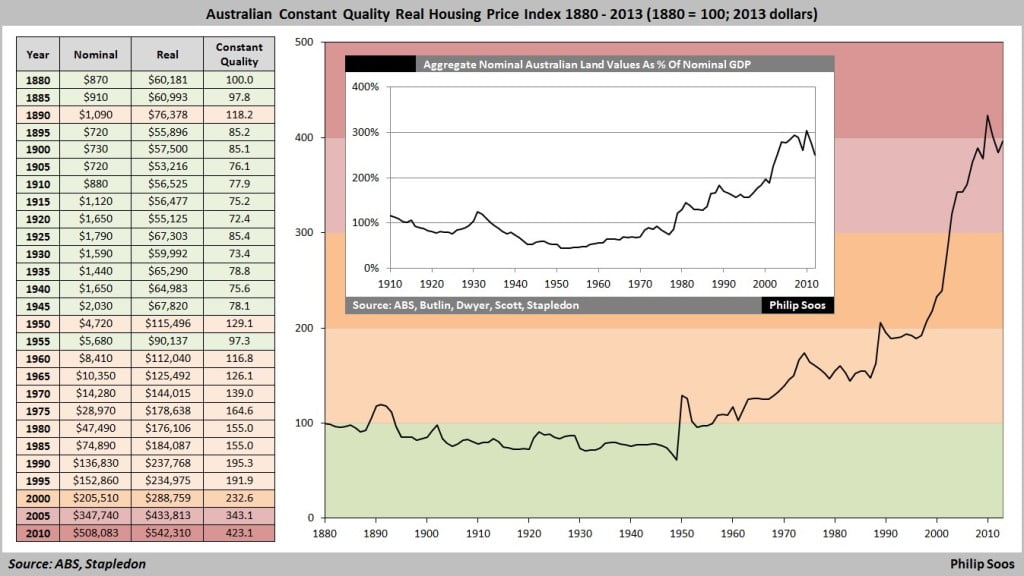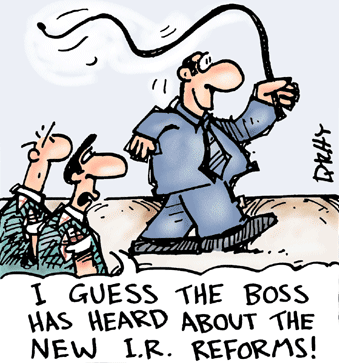Fred Harrison contemplates how Ireland became the plaything of rent-seekers.
Some other posts on Ireland on The Depression website:
Ireland’s deal with the devil: David McWilliams
The (Irish) Land Question: Henry George
Fred Harrison contemplates how Ireland became the plaything of rent-seekers.
Some other posts on Ireland on The Depression website:
Ireland’s deal with the devil: David McWilliams
The (Irish) Land Question: Henry George

Knowing the options for tax reform: that’s the real problem.
Australians WILL have a higher GST inflicted upon them if they don’t realise we need to abolish the 115 taxes the Henry Tax Review found constitute only 10% of our revenue.
NOW IT’S UKRAINE
Michael Hudson provides an insightful piece on what’s happening – not just in Ukraine.
FIRE Sector Marketing Psychology 101: Property Buyer Manipulation
by Paul Egan
I noted in a previous article the usurer choir chimes in unison “There is no housing bubble!” whilst failing to provide a clear definition of what one looks like. It is clear the FIRE (Finance, Insurance and Real Estate) sector will never admit to a bubble in the housing market; one part of their brand of marketing psychology taking advantage of cognitive biases to reinforce irrational behaviour in the investor herd.[1] In FIRE sector fairytales, everybody lives happily-ever-after due to reaping unearned capital gains in a continually inflating market. The Disneyesque implication is that it is always a good time to buy, with the fundamentalism of ‘fundamental factors’ invoked to explain any and all steep housing price inflation, deflecting from the obvious credit bubble as a primary causal factor.
Billions are spent annually on advertising, paid-for opinion and public relations spin. This is part of an elaborate strategy to embed the delusional belief that housing is rationally priced. Emotional pressure to buy is reinforced by subliminal messages, such as failing to own a home somehow reflects a form of personal shortcoming. Often, homebuyers are blissfully unaware their thinking is being hijacked by incessant propaganda and familial/peer-influenced investment frameworks that fail to distinguish value from price. Buyer conformity is encouraged by cultural conditioning, with skeptical minds ridiculed when they step outside the boundaries of the mainstream narrative. In this way, the FIRE sector has successfully re-written societal norms for housing in its favour.
The FIRE sector has scripted a Pollyanna vision of the Australian housing market, imbuing investors with false confidence and helping to transform various myths into urban folklore. The fourth estate has played tag-team, providing a cornucopia of dubious facts, fudged figures and questionable opinion pieces and advertorials that reinforce the ‘It’s Different Here Syndrome’. Divine renovations and mini-makeovers are portrayed in mainstream ‘reality TV,’ miraculously yielding $100s of thousands in profits for postage stamp-sized pigeon coops. A twisted Marxian logic exists, for the opiate of the Australian masses is achieving land baron/baroness status and expropriating effortless economic rent from land and capital gains, forever escaping the PAYE system.
FIRE sector marketing tools, economic dross rebadged as objective analysis, mainstream propaganda, scripted fantasy TV serials (the ‘Property Twilight’ series) and investor naivety/greed that stem from 1% value systems have together developed a new aspirational norm. Gambling on dirt has become acceptable and woven into the new societal fabric of the speculator nation, leaving foreign visitors aghast at the willingness of a nation’s citizens to financialize dwellings, thus depriving normal families of home ownership. The power of the corporate word upon the housing market is influential in manipulating household decision-making and mental processes.
The investor herd has stepped over the line demarcating housing fantasy from reality. Broadly, people have suspended belief that housing prices can dramatically deflate, presumably thinking housing crashes happen to other markets not sharing Australia’s ‘special attributes’. Conditioned minds put forward the same rationale that has accompanied every asset bubble. Cognitive dissonance explains why opinions, facts or observations counter to the accepted belief system are rejected. The alternative reality of committed investors is one transfixed by FIRE sector misinformation and reflexive behavioural responses akin to the automatic response of animals to pre-programmed stimuli in experimental tests.[2]
Hot Property, The Block, Renovation Rescue and other forms of property pulp fiction reflect the pinnacle of the nation’s shared optimistic delusion. Reality TV has spawned infotainment, degenerating further into lightly scripted C-grade celebrity popularity contests that coincidentally take place on a housing set. Modern bread and circuses entertainment is subtly aimed at having the viewer’s suspension of disbelief translate into conditioning that rationalizes buying decisions in an extremely over-priced market. Nuanced and contrived programming lead to a hijacking of beliefs, wherein new values are internalized about housing dynamics. Marketers are well aware most consumers of media will not expend the intellectual effort required to confirm or deny assertions made or implied, and people are unaware of the psychological tools being employed to deceive them and reinforce groupthink.
Like-mindedness of the herd is reinforced by adopting a common set of values and beliefs. Investors typically delude themselves that they are acting independently and are immune to momentum investing, corporate marketing psychology, and the madness of crowds – failing to question investment framework tenets underpinning their future financial well-being. Only a large correction will bring a reality check to the Ponzi market. The credit bubble has spawned a generation of winners over two decades as they rode the roller coaster to the top of the largest residential land bubble on record, but a painful readjustment of the nation’s collective ego will follow the crash. The carefully constructed and destructive property chimera will be shattered.
[1] The term ‘herd’ is used deliberately, as investors tend to collectively invest/divest in the same direction during periods of irrational exuberance (‘momentum investing’). High prices beget ever-higher prices in an upwards virtuous spiral, with the obverse also being true.
[2] The salivation of Pavlov’s dogs in response to the ringing of bells being the most famous case of controlled animal responses.
LAND AND FREEDOM VOL. XXVII No. 1 January/February, 1927
Where Senator Richards Errs
JOHN J. EGAN
SENATOR EMERSON RICHARDS recently delivered an address before the Newark Real Estate Board on the financing of State highways. He advocated a gasoline tax and the quadrupling of the annual license tax on commercial motor vehicles, his idea being that those who use highways should pay for this use a revival of the obsolete toll-road system. The Senator touched but lightly upon the fact that there are others than road users who benefit from the establishment and upkeep of paved highways. He did not, as he well might have done, explain that the only values to be created or increased by the substitution of good roads for poor ones are location or site values.
The Senator knows very well that municipalities assess the cost of highway improvements against contiguous lot holders, this course being legally and morally justifiable. It may well be asked why this Senator, other legislators and the Governor himself do not turn their attention to the possibility of establishing a system by which a large part of the cost of paved highways may be drawn from the holders of locations that are especially benefited, making the assessment levies payable over a period of five or ten years.
There is no reason why New Jersey should follow the bad example of other states in penalizing transportation, industry and trade by a gasoline tax or by the imposition of heavy commercial license fees. Equity demands a revision of our methods of financing highway construction, and the responsibility is upon our legislators to contrive that the revision be in conformity with common sense and good morals rather than with the practice or customs elsewhere. We of New Jersey are entitled to the best system of financing highways that can be devised.
The revision of highway financing should be deferred until there can be a full inquiry into the possibility of accompanying new highway construction with a State system of assessing abutting and contiguous land holders on the basis of the Site-Value created by improved roads.
New Jersey’s Governor
GOVERNOR A. HARRY MOORE of New Jersey, in his first annual message to the 1927 Legislature, after discussing several methods of financing new highway construction, said: “Lastly, I might suggest to you the wisdom of assessing some part of the cost of the road system upon the land specially benefited thereby, as is the practice in municipal improvements. A striking illustration of what might be regarded as an evil of having the State at large pay for major improvements and the land peculiarly benefited by the improvements escape, except in so far as it shares its proportions of the state’s expenses, is in the increase of land values in Bergen county, which came as a result of the projected Hudson River Bridge.”
________________________________________________________________________________________________________
From Herbert H Asquith, Prime Minister United Kingdom 1908 – 1916:
The value of land rises as population grows and national
necessities increase, not in proportion to the application
of capital and labour, but through the development of the
community itself. You have a form of value, therefore, which is
conveniently called ‘site value,’ entirely independent of buildings
and improvements and of other things which non-owners and
occupiers have done to increase its value – a source of value
created by the community, which the community is entitled to
appropriate to itself. …In almost every aspect of our social and
industrial problem you are brought back sooner or later to that
fundamental fact.
 ISN’T WIN/WIN BETTER THAN WIN/LOSE?
ISN’T WIN/WIN BETTER THAN WIN/LOSE?
It was with a great sense of frustration after watching Barrie Cassidy’s interview with Australian Council of Trade Unions (ACTU) secretary, Dave Oliver on “Insiders” this morning, that I dashed off the following thoughts to the program:-
When labour relations are discussed on “Insiders” it is incredible that it is reduced to two options only: (a) the conservatives who would wind back wages and/or penalty rates, or (b) the ACTU and Labor Party who fight this without introducing valid proposals that might widen the debate.
The Henry Tax Review recommended abolishing 115 of Australia’s 125 hopelessly inefficient taxes that raise only 10% of our revenue.
If these 115 taxes were to be abolished, wouldn’t BOTH business and workers reap enormous benefits from their removal – with all their collection costs and the vast deadweight they impose on the economy?
“Insiders” needs to see industrial relations discussion is being terribly restricted.